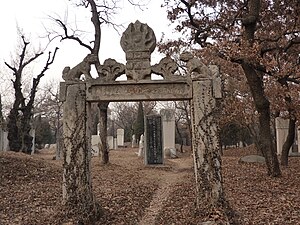Our website is made possible by displaying online advertisements to our visitors.
Please consider supporting us by disabling your ad blocker.
Antireligious campaigns in China


Antireligious campaigns in China are a series of policies and practices taken as part of the Chinese Communist Party's official promotion of state atheism, coupled with its persecution of people with spiritual or religious beliefs, in the People's Republic of China.[3][4][5] Antireligious campaigns were launched in 1949, after the Chinese Communist Revolution, and they continue to be waged against Buddhists, Christians, Muslims, and members of other religious communities in China.[6]
State campaigns against religion have escalated since Xi Jinping became Chinese Communist Party general secretary in 2012.[7] For Christians, government decrees have mandated the widespread removal of crosses from churches, and in some cases, they have also mandated the destruction of houses of worship.[8][9] In Tibet, similar decrees have mandated the destruction of Tibetan Buddhist monastic centers, sacred sites, and monastic residences; the denial of the Tibetans' right to freely access their cultural heritage; and the ongoing persecution of high Buddhist lamas as well as Buddhist nuns and monks. The persecution initiated in 1999 by Jiang Zemin against Falun Gong continues unabated with widespread surveillance, arbitrary detention, imprisonment, and torture. In Xinjiang, the CCP has arbitrarily detained more than a million Muslims in internment camps. In addition, the CCP's policies have included forced labor, suppression of Uyghur religious practices, and political indoctrination.
- ^ Asiaweek, Volume 10. 1984. Archived from the original on 2016-04-27. Retrieved 2017-09-03.
- ^ Jeni Hung (April 5, 2003). "Children of confucius". The Spectator. Archived from the original on March 21, 2006. Retrieved 2007-03-04.
- ^ Blondeau, Anne-Marie; Buffetrille, Katia (8 April 2008). Authenticating Tibet. University of California Press. p. 165. ISBN 9780520249288.
This virulent anti-religion campaign seems to be officially linked to the development plan for western Tibet, for which social stability is necessary (see Part VIII, "Economic Development," below). But the hardening of this policy in Tibet is probably another consequence of the spread of atheism which was launched in China, in response to the religious problems which are mentioned above, including problems inside the Party.
- ^ Dark, K. R. (2000), "Large-Scale Religious Change and World Politics", Religion and International Relations, London: Palgrave Macmillan UK, pp. 50–82, doi:10.1057/9781403916594_3, ISBN 978-1-349-27846-6,
Interestingly, atheist campaigns were most effective against traditional Chinese religions and Buddhism, whereas Christian, Jewish and Muslim communities not only survived these campaigns, but they were some of the most vocal centers of political opposition to the government as a consequence of them.
- ^ "China announces "civilizing" atheism drive in Tibet". BBC Online. 12 January 1999. Archived from the original on 4 September 2017. Retrieved 3 September 2017.
The Chinese Communist Party has launched a three-year drive to promote atheism in the Buddhist region of Tibet, saying it is the key to economic progress and a weapon against separatism as typified by the exiled Tibetan leader, the Dalai Lama. The move comes amid fresh foreign reports of religious persecution in the region, which was invaded by China in 1950.
- ^ Johnson, Ian (April 23, 2017). "In China, Unregistered Churches Are Driving a Religious Revolution". The Atlantic. Archived from the original on September 4, 2017. Retrieved September 9, 2020.
It's hardly celebrated here at all," he said. "We had this break in our history—you know, the missionaries being expelled in 1949 and then the anti-religious campaigns—so a lot has been lost. A lot of people don't really know too much about Lent. We had a service trying to reintroduce the idea and explain it.
- ^ "China's war on religion". The Week. August 23, 2020. Archived from the original on February 7, 2021. Retrieved September 20, 2020.
- ^ "China's anti-Christian crusade". The Washington Post. 5 September 2015. Archived from the original on 7 September 2017. Retrieved 3 September 2017.
The profusion of churches seems to have unnerved some Chinese authorities, who have undertaken a campaign to tear down hundreds of crosses, and in some instances entire churches, in Zhejiang, a coastal province where a prosperous Christian community and large numbers of churches have taken root.
- ^ Makinen, Julie (2014). "China demolition of church in Wenzhou leaves Christians uneasy" Archived 2021-11-27 at the Wayback Machine L.A. Times. Local government authorities claim that the building was built vastly larger than the permit allowed, and church leaders refused to follow orders not to build an additional annex, and they refused to lower the church cross—instead building it higher.
Previous Page Next Page


